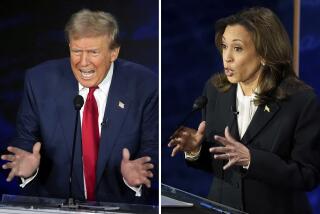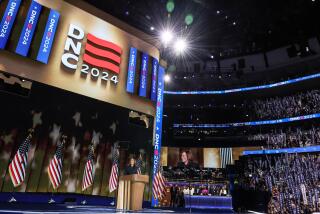Pundits Long on Coverage, but Short on News
- Share via
NEW YORK — Hours before President Clinton delivered his speech to the nation Monday, the media gabfest had begun. One by one, before he spoke, an army of TV pundits suggested what the president should say--and then dissected his brief address minutes after he delivered it.
The general view was that the president had delivered an effective statement, but may have come up short in his immediate desire to put the Monica S. Lewinsky story behind him. Few commentators believed the incendiary issue would vanish any time soon.
“He [Clinton] spoke effectively, and this [speech] tonight was an effort to mobilize the public behind him,” PBS commentator and former White House communications director David Gergen said. “He didn’t mind dividing people [in criticizing independent counsel Kenneth W. Starr]. . . . He was trying to rally people to his side, the people who are already with him.”
George Stephanopoulos, an ABC-TV commentator and former White House communications director under Clinton, shared that view, but cautioned, “He wanted to use his high public approval ratings to bring closure to this right away, but I don’t think it will happen. We still have a long way to go.”
Others were not so charitable. Bay Buchanan, a conservative commentator on CNN, attacked Clinton’s speech as “lacking credibility,” and said, “Let’s look at the misuse of women by this White House, just since January,” ticking off the case histories of Lewinsky, Paula Corbin Jones and Presidential Secretary Betty Curie, who spent hours before the grand jury and ran up expensive legal bills.
Throughout the veneering, there was a cacophony of analysis. Pundits weighed the president’s words, body language, tone, what was on the set, how he should next conduct himself--one person on PBS suggesting that he shouldn’t be seen golfing this week, in order to sow the proper sense of atonement.
Before Clinton’s 10 p.m. EDT speech, the talking heads were speculating about what the president would say, and how he would say it. Many predicted a contrite, low-key speech that would avoid any mention of Starr’s investigation. Others predicted a defiant, provocative set of remarks. Both sides were wrong.
“I think it’s much too short of a speech for what he has to say,” Gergen said earlier in the afternoon. “Seven minutes is just not enough time.” Others wondered if the president would be too tired to appear on television, and some predicted that he would, in fact, only provide written remarks.
“I think we need some perspective here,” Washington Post reporter Bob Woodward said on CNN. “It’s quite possible that we have absolutely no idea about the most important aspects of the testimony that the president gave to the grand jury this afternoon. We can’t say too much, because we don’t know.”
Those words of advice were lost on many, however, as commentators geared up to cover the dramatic story earlier in the day. The virtually nonstop coverage on all news cable stations began hours before grand jurors arrived at the federal courthouse in Washington, and long before Starr showed up at the White House during the afternoon to interrogate Clinton.
“We’re covering a momentous day in this country,” MSNBC-TV anchor Brian Williams said. Fox News called it “The Showdown,” with a musical theme worthy of James Bond. The only problem was, on perhaps the most dramatic day of the year in Washington, there was precious little news to report until Clinton finally appeared on television in the evening.
Starting at 8 a.m., TV pundits talked . . . and talked . . . and talked about the affair, recycling the same theories, tidbits and gossip that have fueled the Lewinsky story since January.
“We have not a hint of what President Clinton is saying,” said CNN reporter Mark Potter, proceeding to summarize rumors of what Clinton might tell Starr behind closed doors. “We’ll be back when we have something to report,” Williams said, launching yet another hour of speculative coverage.
It was a news orgy without news: Viewers saw endless tape loops of Clinton embracing Lewinsky; Clinton’s angry denial of having had sexual relations with the former White House intern and the president leaving Sunday church services with his wife, First Lady Hillary Rodham Clinton.
There was a similar dearth of breaking news on talk radio shows and on the Internet. At one point, C-SPAN aired the Dennis Praeger talk show from KABC in Los Angeles. While listeners waited hours for news, the talk show host revisited the history of the tawdry White House story, reserving much of his ire for feminists, who he said have been too easy on Clinton.
As the president’s dramatic testimony began, wrote James Poniewozik in Salon, an on-line magazine, he had “turned the media into a massive focus group. . . . He in effect decreed a national holiday--Testimonyday--and opened a punditry Olympiad that would help finance second homes and midlife-crisis car purchases up and down the northeast corridor.”
Indeed, irony was in short supply. For several hours, CNN featured a “time elapsed” clock showing how long Clinton had been testifying. Fox TV News had several airings of “All the President’s Women,” including Gennifer Flowers, Jones, Kathleen Willey and others who have accused Clinton of misconduct.
At one point, MSNBC broke into its coverage with the breathless announcement that a reporter had inadvertently seen inside the grand jury room for five seconds, before the doors closed. One person on CNN compared the secrecy surrounding tests on Lewinsky’s dress with that preceding D-Day.
“There has been public criticism of excessive media coverage,” CNN’s Potter said. “But there are few doubts that today’s massive coverage is warranted.”
Researcher Lisa Meyer in New York contributed to this story.
More to Read
Sign up for Essential California
The most important California stories and recommendations in your inbox every morning.
You may occasionally receive promotional content from the Los Angeles Times.













